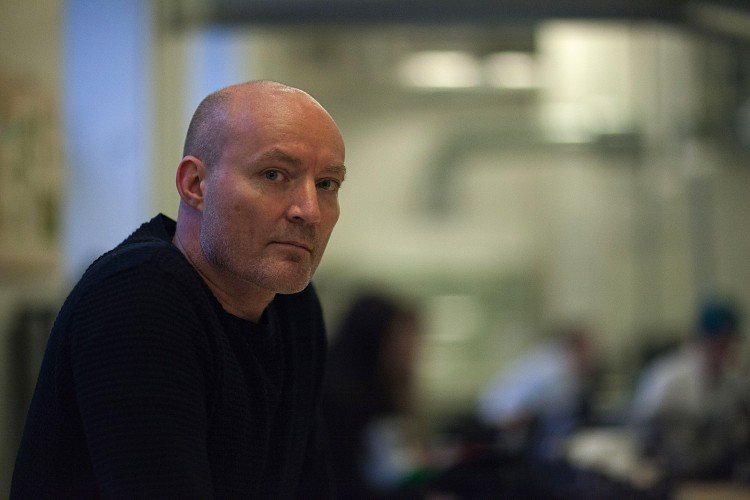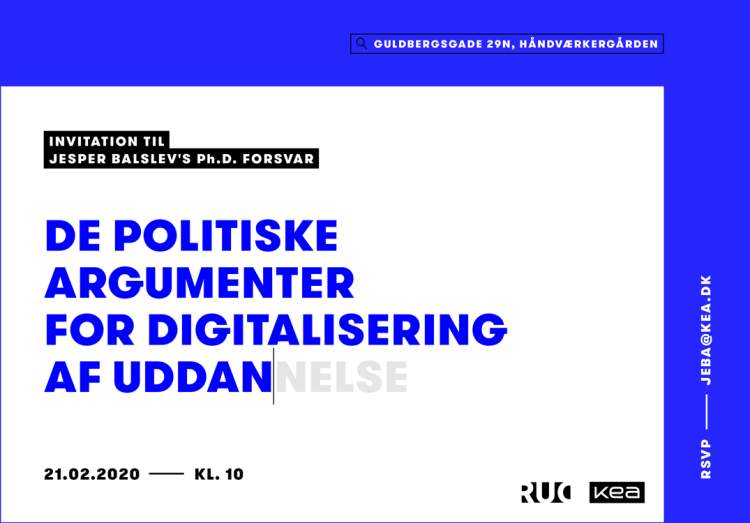As in the adventure of the Emperor's New Clothes, we have spent enormous resources on digitalising education in anticipation of an impressive result. But the results are still absent after four decades, Jesper Balslev concludes in his Ph.D. thesis.
Does digitalisation wear any clothes?
Denmark is the most enthusiastic country in the world when it comes to adopting a special variant of Silicon Valley solutions for education, a "consultant version" of pedagogy and didactics, as Jesper Balslev, senior lecturer at KEA, puts it.
He is the author of the book 'Criticism of Digital Reason – in Education', and on Friday 21 February he defends his PhD thesis 'Evidence of a Potential'. The thesis is about the high incidence of evaluation reports showing that there is no evidence that the massive investments in digital teaching funds have in fact resulted in any measurable learning effect. It is also about the fact that we have misunderstood what it means to equip children and young people with 'digital competences'.
"It is a common pattern that digitalisation projects are legitimised with a future that is just around the corner. Digitalisation presents itself as an omnibus solution that takes care of everything from children's learning, to the data needs of managers and student engagement. And it is done in a way that often gives politicians and bosses a sense of action: 'let's try it - at least, it will give us some experience'. But negative experiences are forgotten, and the knowledge base is pervasively very poor – they often don't know that there is anything other than the consulting version of Silicon Valley. They think that data equals knowledge. They send infographics to each other and make strange short circuits that cost a lot of money. At best, they do not make any difference. At worst, they have negative consequences for our children and young people. But, funny enough, when you talk to the Silicon Valley people themselves, they're quite different - they know that all the digital stuff is empty and without effect unless education, professionalism, imagination and social skills are there to begin with," says Jesper Balslev.

A completely different approach in France
At one point, he was invited to a research stay in Paris i.a. to convey his uncovering of political thinking in the field over the past 40 years and, above all, the absent effects. Here he experienced a completely different approach.
"You can take the ongoing critical debate in Denmark and multiply it by 1000. And as a result of that debate and criticism, I experienced a reality in which you co-think professionalism, digitalisation and cooperation with companies, but in a completely different way than in Denmark," says Jesper Balslev.
In a classic French manner, the mayor of Paris had not only put a consultancy on the task of the city's urban development project up to the 2024 Olympics. He also invited a number of French philosophers together with partners from the business community and foreign guest speakers to formulate principles on how to make investments.
"In Denmark, we'd think 'Yes, Smart City, we just need sensors everywhere, and then we're going to make smart solutions on the internet'. But in the Paris that I experienced, they said "No, we're going to have a truly smart city."
What does “truly” imply?
"That you don't fall for the latest gadget or technology and say, 'It's smart, we need to have that'. They look at what they need before they include technology: there are problems they need to solve, and then they develop precise and local solutions in a way that allows the political strata, the big companies and educational institutions to work together. In other words, it does not stem from an infatuation with a generic product or a strategy of 'more digitalisation', but from tailor-made solutions where identifiable people are held accountable for them."
The five largest companies in France including the telecommunications company Orange, the aircraft manufacturer Dassault and Vinci, the world's largest construction company, were involved in the cooperation that Jesper Balslev witnessed.
"Their angle was that the only way they can survive as companies in the long term is if society consists of dynamic and vibrating environments where people are well educated and have developed cognitive capacity and competencies that are not dependent on anything digital. Because these are the kind of people who do good business. But if the trend of digitisation continues as before, there is a fear that we will be left with “swipers” and distracted young people. The industry wants critics, and they want someone with concrete skills, which is unlike much of the digitalisation that is popular today. Digitalisation often acts as generic skills – at least the variant that Denmark buys into."
Industry demands 21st century skills - not “swipers”
Jesper Balslev has also experienced this in connection with the publication of his book, and at the lectures he gives:
"I have seen that parts of the industry are happy about the criticism because in fact 'swipers' were never really in demand. Large parts of blue Denmark want skills and education because that is the prerequisite for everything else. Therefore, I think that what we are witnessing now are the last convulsions of a dominant system - severe criticisms are expressed in many places."
The French philosopher Bernard Stiegler, who has technology and digitalisation as his specialty, believes that we need to formulate some fundamental principles for our handling and understanding of digital technology. A conspicuous thesis is that digital technology can do a lot, but that every time we digitalise something, we need to de-digitalise something else. It requires continuous assessment and prevents us from burning out as human beings.
"That's what happens with too much screen – a lot of human energy that's not being circulated anymore. Bernard Stiegler's principle opens up the possibility that we can use it where it fits without tipping the balance. Digitalisation must build knowledge instead of stealing knowledge."
But that’s exactly what digitalisation does, the enthusiastic ones would reply?
"Bernard Stiegler points out that knowledge is 'intrasomatic' - that you get something into your body - but we are in the process of placing many cognitive functions outside our heads. We put thoughts and reflection outside our body, and we must stop doing so – or at least be aware of what it might cost. For example, when we use iPads to write with, we lose some of the psychomotor skills associated with reading and writing, which make our body absorb what we learn. Knowledge is something you build up in yourself," says Jesper Balslev, who believes that we will look back on this era in the same way that we are now looking back at the time, 20 years ago, when we were allowed to smoke in the waiting room of the doctor:
"It is absurd that students are on Facebook while they are being taught," says Jesper Balslev. "It's a strange form of over-digitalisation."
"We need to be careful not to lose too much to digitalisation. Professionalism can disappear as digitalisation increases, so it's about asking 'what is the relationship between professionalism and digitalisation – is there a balance?' Are we critical or crazy when it comes to purchasing and implementing digital technology? This is where a criticism such as Stiegler’s can be used. It can open up other perspectives, and that is why companies like Orange, Vinci and Dassault work with him - because the criticism is needed. They know what's at stake."
"We need to be careful not to lose too much to digitalisation. Professionalism can disappear as digitalisation increases, so it's about asking 'what is the relationship between professionalism and digitalisation – is there a balance?' Are we critical or crazy when it comes to purchasing and implementing digital technology? This is where a criticism such as Stiegler’s can be used. It can open up other perspectives, and that is why companies like Orange, Vinci and Dassault work with him - because the criticism is needed. They know what's at stake."
Technology should be the subject of teaching - not the means.
The technological space is a place where you often get carried away by all sorts of fascinating ideas about the future. But in relation to education and teaching there are some aspects that are timeless and immensely difficult to replace by technology. Therefore, you get more out of making these technologies the subject of teaching rather than the means of teaching, Jesper Balslev believes:
"It is important to relate to new technologies, but it is pointless to make major societal investments in `the flavour of the month´, which later turn out to be a waste of money. There is a tendency to join what’s new no matter what. But there are some fundamental problems associated with using technology in teaching – once all schools had to have smartboards, but that didn't bring us better learning."
On the other hand, it makes sense to examine the technologies themselves, says Jesper Balslev. Often there is more learning associated with analysing the technical insides, examining what suppliers promise, understanding what interests they represent and where they undermine the professionalism and oversell the visions. Unfortunately, the latter has proved to be a constant: The past 40 years, the same message has been repeated over and over again: There's a lot of potential here. The potential just never seems to be released.
"We need to be more ambitious than that. We must dare to relate critically to everything – not least new technologies. Good teachers, of whom there are many at KEA, can create value out of many things – including computers. But how high is the value in relation to the cost? I would like us to always be the first to critically examine new technology – not teach with it, but scrutinize it."
It goes wrong when you take technology for granted and talk about it as infrastructure, says Jesper Balslev.
"Today, the computer is always on, and every time you have to think, you sit in front of a mental convenience store that serves you a kind of fast food. But we cannot get round the work required to achieve genuine knowledge and education, namely to spend a lot of time obtaining experience and knowledge and think about it. That work needs to be done over and over again, and it is only a competent teacher with a critical sense who can do it. Our thinking gets lazy when we constantly get answers from a device programmed to give us what we want."

About the Author


